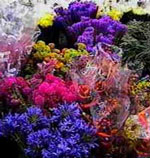The more the agribusiness folks mess about with transplanted genes and toxic chemicals and irradiation, the better the market for local, fresh, organic, un-messed-about-with foods. When it comes to things we’re going to put into our mouths, things that are literally going to become us, we consumers are cautious, and rightly so.
But what about crops we don’t eat? What, for example, about flowers? Whether we grow our own or buy them in a shop, need we care whether they carry pesticide residues or genes from a fish? Does it make sense to buy or grow organic flowers?

Potentially dangerous beauties.
I’ve just come across two articles that remind me how much sense it makes. One is a report on flower farms in Latin America, which export to our florists year-round. I’ve seen some of those farms in Costa Rica. Imagine acres and acres under plastic tents, not to keep out the balmy climate but to allow fumigation against tropical pests and molds. Inside the tents the soils are doused with chemicals of sorts and at concentrations that would never be allowed in the United States. Nor would our workers be allowed to enter that toxic atmosphere.
The flowers, flown to us overnight, are beautiful. Smelling and admiring them won’t hurt us. Those Costa Rican workers do at least have jobs. The export money is important to Latin American countries. Why should we care how they grow flowers?
We should care because those poisons don’t stay inside the tents. They drift out, they walk out on the clothes of the workers, they enter the bodies of their children, filter into groundwater, work their way up the tropical food chain, at the top of which are songbirds whose return we await up north every spring. Some of those chemicals attack the ozone layer that stretches over and protects us. Some evaporate and fall as rain or snow anywhere from the North Pole to New England. We are materially connected to those flower farms, as we are connected to all the circulating flows of the planet. Not as intimately as if we were eating the flowers, but strongly enough to care.
I care about the workers, too. I’ve looked them in the face. I can’t be unconcerned about their health or jobs or children. If those flowers were grown organically, there would probably be more jobs, and healthier ones. It might not be possible to grow all types of flowers organically, especially not types foreign to the tropics. It might not be possible to specialize in acres of a single flower. The crops might have to be mixed, rotated, varied.

This bud’s for you.
Flowers grown that way could cost more, though maybe not, because the additional labor would be offset by fewer expensive chemicals. Flowers might not come to us as predictably in as great a variety at all seasons. This is one of those many situations where something comes easy and cheap to rich folks because it costs distant poor folks a lot, not just in lousy wages, but in health and in the debasement of their local resources and environment. That kind of cheap, however beautiful and predictable and convenient, I can’t enjoy.
The other article that came my way was about growing our own flowers. It was excerpted from the book Step by Step Organic Flower Gardening by Shepherd Ogden.
Ogden once asked the rose gardener at the Brooklyn Botanic Garden whether he uses chemical sprays to take care of one of the world’s most important rose collections. (It’s commonly believed that roses are hard to grow, requiring constant dusting and spraying.) The rose curator said no, he didn’t use chemicals. Why not? Ogden asked. “I love roses,” was the answer. “I want to be here still enjoying them in 20 years.”
“Dusts and sprays have a nasty habit of not staying where we try to put them,” says Ogden. “I have known very few gardeners who actually follow the complete, detailed directions on pesticide labels. To do so, you would have to spend your days in a rubber suit or doublewashing clothes and telling the children to stay off the lawn or away from the flower garden. I’d rather spend my time in the garden handpicking insects, as archaic as that might seem.”
I can’t imagine why anyone would use pesticides on his or her own property. They’re not only hazardous, they’re unnecessary. I grow all kinds of flowers, I have knockout bouquets from early spring daffodils to post-frost asters, and I don’t use sprays. But Ogden says the average suburban gardener applies lawn and garden chemicals at per-acre dosages six times those of farmers.
Talk about intimate connections! Who would want their dogs, cats, kids, or selves to live in that kind of toxic haze?
Most commercial flower growers around me use pesticides, usually minimally and apologetically, but not so much to save a threatened crop as to save work. Believe me, I sympathize with that motive. Farmers’ time and money are always pushed to the breaking point. I’m willing to push them less by paying more for flowers grown without poisons. I do know farmers, in both tropical and temperate zones, who produce flowers on a commercial scale that way. I know it can be done, and so does Shep Ogden, because he does it.
Says Ogden, “This knowledge stops the swindle, the con whereby efficient, manual, and humane methods were replaced with expensive, high-tech mechanical and chemical methods. It frees us to go back out into the sun and the wind, to listen to the birds and enjoy a quiet moment observing the daily drama of the insects, … rather than accommodate ourselves … to the clamor and stench of industrialism.
“I’m sorry, but organic gardening was here long before the merchants and their machines, and we organic gardeners will still be here long after the oil is gone and the world has quieted down again.”

